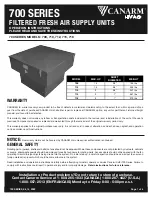
17
P
RIME•
T
OUCH
®
Please refer to this troubleshooting guide before requesting service or contacting your dealer for assistance.
TROUBLESHOOTING TIPS
PROBLEM POSSIBLE
REMEDIES
Fan will not start
• Check the main circuit fuses, circuit breakers, and wall switch position. Check all
wire connections. Make sure the power is turned off during this inspection.
• The battery is weak. Install a fresh battery.
• The fan receiver is defective. Replace the fan receiver.
• Check the frequency setting: Turn the power off at the circuit breaker for the fan
that is not functioning only. Check that the jumper switches match in both the
receiver and the transmitter.
Fan wobbles or shakes excessively
• Be sure the canopy pin is set properly into the slot on the ball.
• Check that the bladeholders have not been bent during installation and that the
blades are balanced.
• The hanger bracket and/or the ceiling outlet are attached too loosely. Make sure
the hanger bracket is attached tightly to the ceiling outlet box and the downrod
assembly is secured fi rmly.
• The downrod is attached to the downrod base too loosely. Make sure all the
screws are securely tightened.
Fan is noisy during operation
• Check and tighten the light fi xture retaining screws, glass shade screws, and
lightbulbs.
• Tighten the canopy screws and mounting plate assembly. Make sure the wire
nuts inside the canopy and switch housing are not touching the metal parts and
that they have not fallen off the wire splices. Tighten as necessary.
• Tighten the blade holders to the fl ywheel (or Direct Drive motor) and the blades
to the bladeholder screws.
• Make sure all the screws in the motor housing are snug but not overly tight.
Fan does not run on low speed
• If fan is new, it may need to be “broken in.” Run at high speed for several days.
Battery life is short
• Replace with alkaline batteries.
Light works, but fan does not work
• The fan wires are not connected properly.
Fan and light run only on full speed
• The fan receiver is defective. Replace the fan receiver.
Fan is missing one speed
• The fan receiver is defective. Replace the fan receiver.
Fan does not change speed, but light works • The fan receiver is defective. Replace the fan receiver.
Reverse does not work
• The fan receiver is defective. Replace the fan receiver.
Fan starts working by itself
• There is frequency interference.
Fan operates only when transmitter is close • Check that antenna wire is not touching the metal plate.
Fan works, but light does not dim
• The fan receiver is defective. Replace the fan receiver.
Fan works, but light does not work
• The fan receiver is defective. Replace the fan receiver.
• The light socket is broken. Replace the socket.
• A lightbulb is defective. Replace the lightbulb.
NOTE: In compliance with US Federal Energy
NOTE: In compliance with US Federal Energy
Regulations, this ceiling fan contains a device that
Regulations, this ceiling fan contains a device that
restricts the light kit to a maximum of 190 watts.
restricts the light kit to a maximum of 190 watts.
Exceeding that limit or the marked limit on this product
Exceeding that limit or the marked limit on this product
may result in a fi re hazard or improper operation.
may result in a fi re hazard or improper operation.


































